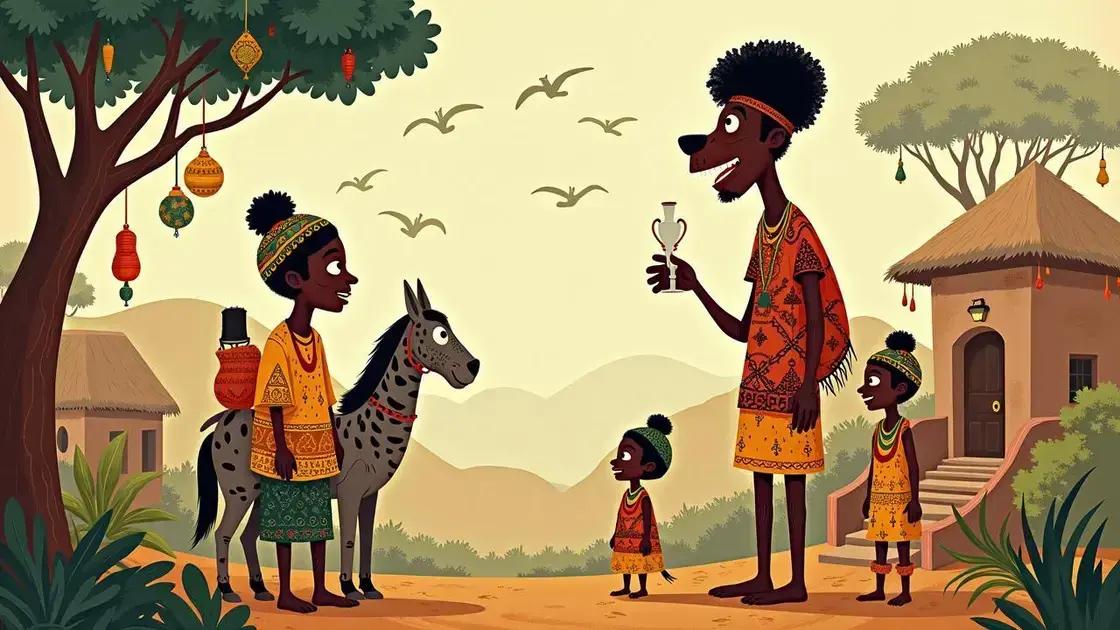The African Trick is a fascinating blend of myth and reality, embodying clever narratives that emphasize wit and resourcefulness while teaching cultural lessons about morality and community values. These stories resonate today in literature and art, bridging traditional wisdom with modern society.
The concept of the “African Trick” is often surrounded by intrigue and debate. Is it merely a myth or does it hold deeper truths rooted in African culture? Understanding the origins and implications of this phenomenon can shed light on its significance in various communities. In this article, we will explore the origins of the African Trick and its cultural impact, examining the fine line between myth and reality.
Exploring the Origins of the African Trick

The African Trick has a rich history that intertwines with various cultural narratives across the continent. It often represents a clever ruse or a surprising outcome, deeply rooted in folklore and societal teachings.
Historical Background
Throughout history, many African cultures have used stories of tricks and cunning to teach moral lessons. These tales often feature clever protagonists who outsmart their adversaries, emphasizing wit over brute strength. For example, the trickster character, widely seen in various African folklore, directs the plot and provides insight into human nature and societal values.
Regional Variations
Each region in Africa has its versions of the trick narrative. In West Africa, the character of Anansi the Spider is famed for his mischievous and clever antics. In Southern Africa, tales surrounding the Jackal showcase similar themes of wit and deception. This variation illustrates how deeply embedded these stories are in local traditions and practices.
Meaning and Interpretation
The African Trick serves not only as entertainment but also as a reflection of community values. Stories often prompt listeners to think critically about justice, morality, and community cohesion. The interpretations can vary widely, reflecting the audience’s understanding, age, and cultural background.
Connection to Contemporary Culture
Modern interpretations of the African Trick continue to appear in literature, performance arts, and even popular media. These adaptations often seek to preserve the original meanings while making them relevant to younger generations. By exploring these dynamics, we can appreciate how traditional stories evolve and maintain significance in today’s society.
Cultural Impact: Myths vs Reality of the African Trick

The African Trick has generated various myths and misconceptions over the years. Some people view it as purely fictional, while others believe it reflects genuine practices within specific cultures. The truth lies somewhere in between.
Understanding Myths
Many myths surrounding the African Trick stem from misinterpretations of stories shared within communities. These tales, often exaggerated over time, contribute to a broader understanding of culture and social norms. For instance, the idea that all trickster tales promote negative behavior is far from accurate. They often serve to highlight cleverness and resourcefulness, encouraging problem-solving and adaptability.
Realities of Cultural Practices
In reality, the African Trick is not merely a creation of fiction. Many communities incorporate these stories into daily life, teaching valuable lessons about ethics, morality, and community bonding. Such tales inspire individuals to think critically and navigate complex social dynamics. This cultural impact is profound, as it shapes perspectives and behavior across generations.
Influence on Modern Society
Today, the myths and realities of the African Trick resonate in literature, film, and art. Modern storytelling often revisits these themes, adapting them for contemporary audiences while preserving their core messages. This adaptation reflects the ongoing importance of such cultural narratives in understanding identity and society.
Bridging the Gap
To fully appreciate the African Trick, one must recognize the delicate balance between myth and reality. While myths may entertain and exaggerate, the underlying truths play a critical role in cultural continuity. By exploring these narratives, we can better understand the richness of African heritage and the lessons these stories impart.
In Summary: Understanding the African Trick
The concept of the African Trick presents a fascinating interplay between myth and reality. Through exploring its origins and cultural significance, we gain insight into how these tales reflect the values and lessons of various African communities.
These stories, while often sensationalized, impart wisdom that transcends generations, showcasing cleverness and resilience. By acknowledging both the myths and the realities surrounding the African Trick, we can appreciate its enduring relevance in contemporary society.
Ultimately, the rich narratives that encapsulate the African Trick invite us to reflect on our cultural heritage and the shared human experience.
FAQ – Frequently Asked Questions about the African Trick
What is the African Trick?
The African Trick refers to clever narratives found in various African cultures, often highlighting wit and resourcefulness through traditional storytelling.
Are there genuine practices behind the African Trick?
Yes, while many aspects are mythologized, the African Trick reflects real cultural values, teaching lessons about ethics and community cohesion.
How do myths and realities differ regarding the African Trick?
Myths often exaggerate tales for entertainment, while the realities emphasize the practical lessons and moral values imparted through these stories.
Who are the main characters in African Trick stories?
Common characters include tricksters like Anansi the Spider in West Africa and clever animals like the Jackal in Southern Africa, each illustrating cultural themes.
How are modern societies influenced by the African Trick?
The themes of the African Trick continue to inspire literature, film, and art today, allowing these traditional stories to remain relevant for contemporary audiences.
What lessons can we learn from the African Trick?
These stories teach the importance of cleverness, critical thinking, and moral integrity, which are crucial for navigating complex social landscapes.













